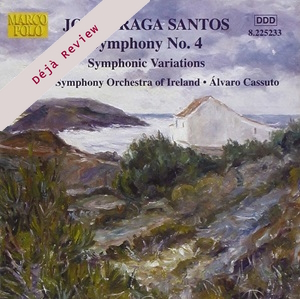
Déjà Review: this review was first published in September 2002 and the recording is still available.
Joly Braga Santos (1924-1988)
Symphonic Variations on a popular song from the Alentejo (1951)
Symphony No 4 (1951)
National Symphony Orchestra of Ireland/Álvaro Cassuto
rec. 2001, RTÉ Concert Hall, Dublin, Ireland
Marco Polo 8.225233 [68]
Could the Symphonic Variations have been written without intimate knowledge of Debussy’s La Mer and of Ravel’s Daphnis? I doubt it. However such overwhelming impressions did not obliterate Braga Santos’s individuality. Rather, they helped bear it up and were a vehicle for the folk inspiration that lights his most instantly communicative works. The Symphonic Variations will not disappoint you if you already adore Moeran, Kodály, Hanson, Vaughan Williams, Sibelius or Delius. This music rises from mists to sunrise splendour to a vigorous wildly stomping hammered rhythmic statement of considerable duration. There is then a cinematographically delicious fade into a mellifluously chuckling haze (9.52). Only in the bombast of the closing pages with their echoes of Delius’s Appalachia and Sibelius’s Second Symphony do things momentarily lose their creative grip.
The Alentejo folk heritage can often be heard in these two works, which share the same year of composition. They are also, in this respect, influenced by the only slightly less compelling symphonies of Luis de Freitas Branco (1890-1955) which have been recorded by Portugalsom and reviewed here. It is worth reminding ourselves that the first four Braga Santos symphonies date from the ages of 22 and 25. All are instantly accessible without being spineless or lacking character. They are simply glorious symphonies that must be heard. Let me assure you that once you get Braga Santos’s themes in your head, they cannot be shaken off.
The Fourth Symphony has all the virtues of the Symphonic Variations but an epic span as well. Brucknerian parallels must be expected, but you also have Mahlerian-Delian encounters as in the opening of the Andante. In the rather Vaughan Williamsy third movement at 3:33 comes one of those magically flowing golden melodies that only Braga Santos can call down from an untroubled blue sky. Russian celebratory festivity marks the finale in echo of the fourth movement of Rachmaninov’s First Symphony (9:22 and 10:04 tr5). I suppose there is a tendency for Braga Santos to produce a great idea and bring it round again and again, but those ideas are very well held together and presented. Listen to those punched out horn grunts at 6:23 launching another fine broad melody at 6:53 and all the time recalling Vaughan WiIliams’ Fifth and the Moeran G minor. The trumpets of the Irish orchestra make a far less fallible job of those pecked and long repeated notes than Silva Pereira’s Portuguese players on Portugalsom. Cassuto lacks the choir that should appear in the last five minutes. We therefore miss the lump-in-the-throat hymn to youth and the hope-filled shining skies of tomorrow. Nevertheless Cassuto makes a wonderful job of the peroration. Very convincing – blazing with optimism; buoyant with joy. We need more music like this.
With the Fifth and Sixth Symphonies Braga Santos’s language took a radically different course invoking Second Viennese paradigms.
This music is delivered with smashing conviction by the RTÉ orchestra. Interesting that Cassuto and Marco Polo have switched orchestras from the earlier instalments. The sound quality is a great improvement on the Portugalsom recording of the Fourth Symphony (Silva Pereira conducting). The performance is just as spirited, lively and raspingly aggressive.
Braga Santos – a nationalistic impressionist with Iberian exoticism tempered with the crash of the Atlantic combers and oceanic blue, green and aquamarine.
Rob Barnett
Buying this recording via a link below generates revenue for MWI and helps us keep free access to the site




















